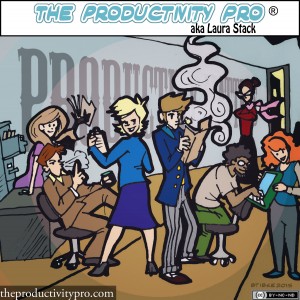“Productivity is never an accident. It is always the result of a commitment to excellence, intelligent planning, and focused effort.” – Paul J. Meyer, American motivational speaker
 In the 25 years since I started my company The Productivity Pro, Inc., I’ve worked with literally hundreds of teams on improving their performance and collective productivity.
In the 25 years since I started my company The Productivity Pro, Inc., I’ve worked with literally hundreds of teams on improving their performance and collective productivity.
Here are the 15 characteristics I’ve seen in those that are the most successful:
- Productive teams celebrate social events like holidays, birthdays, and anniversaries in order to increase cohesion. They also celebrate their wins, especially when they complete a tough project.
- Committed to results vs. activity. It’s easy to confuse busyness with productivity. Only outcomes and results matter. Running around being very busy doesn’t mean you produced anything of significance.
- Team members work together closely, so the process flows smoothly, and everyone makes their contributions on time. People can rely on others to do what they say they’ll do, when they say they’ll do it.
- The team encourages its members to use their brains to invent new ways to save time and money and to earn more profits for the company.
- The team members care about their work and the team goals. They’re engaged enough to own their jobs, help each other when needed, and contribute discretionary effort to projects.
- Diverse skill sets. Not everyone knows how to do everything, but someone’s skill set represents every need the team requires. Some overlap is nice for times when a particular person is away, but the team avoids excessive duplication of skills.
- Roles are clear. Each person understands their responsibilities and what the other members of the team expect. They don’t waste time duplicating the work of others or second-guessing their teammates.
- Effective, open communication. All team members share data, problems, and concerns, so the team can hammer out solutions. The team needn’t function without friction, but it must produce results quickly and efficiently.
- When something goes wrong or exceptionally well, team members let each other know. When things go wrong, they clear the air with frank, open feedback. They also fully discuss new ideas and listen to everyone without dismissing anything out of hand.
- Known targets. Team goals are transparent and clear. The whole team needs to know what target they’re trying to hit, why it matters, and how their personal contributions help, so they can more easily work together.
- Initiative begins at the individual level, and people know they won’t punish them when they take it. Many of us have suffered for taking initiative in the past, especially when we messed up. But without initiative, workers can’t empower themselves to engage and own their jobs.
- Simply put, team members who respect each other know their co-workers as talented individuals capable of doing their jobs well, and admire their ability to do so. They also respect them as human beings.
- Ability to focus. All team members must have the ability at times to focus tightly, ignore distractions, and concentrate uninterrupted. Great team members know when to leave someone alone without taking it personally.
- Team members not only get their work done efficiently, but they pitch in to help teammates who have fallen behind. They work to clear up process problems and other bottlenecks.
- Not everyone does the same tasks the same way; nor do they all relate to each other in the same way, any more than they all have the same accent or skin color. Tolerance in all things is another foundation of high-achieving teams.
Beyond this List
If you belong to a truly impressive team, I suspect you can add to this list. What characteristics would you add to the list of highly productive teams? (click to tweet)
© 2015 Laura Stack. Laura Stack, MBA, CSP, CPAE is an award-winning keynote speaker, bestselling author, and noted authority on employee and team productivity. She is the president of The Productivity Pro, Inc., a company dedicated to helping leaders increase workplace performance in high-stress environments. Stack has authored seven books, including her newest work, Doing the Right Things Right: How the Effective Executive Spends Time (Jan. 2016). She is a past president of the National Speakers Association, and in 2015 was inducted into its exclusive Speaker Hall of Fame (with fewer than 175 members worldwide). Stack’s clients include Cisco Systems, Wal-Mart, and Bank of America, and she has been featured on the CBS Early Show and CNN, and in the New York Times. To have Laura Stack speak at your next event, call 303-471-7401 or visit her website.


